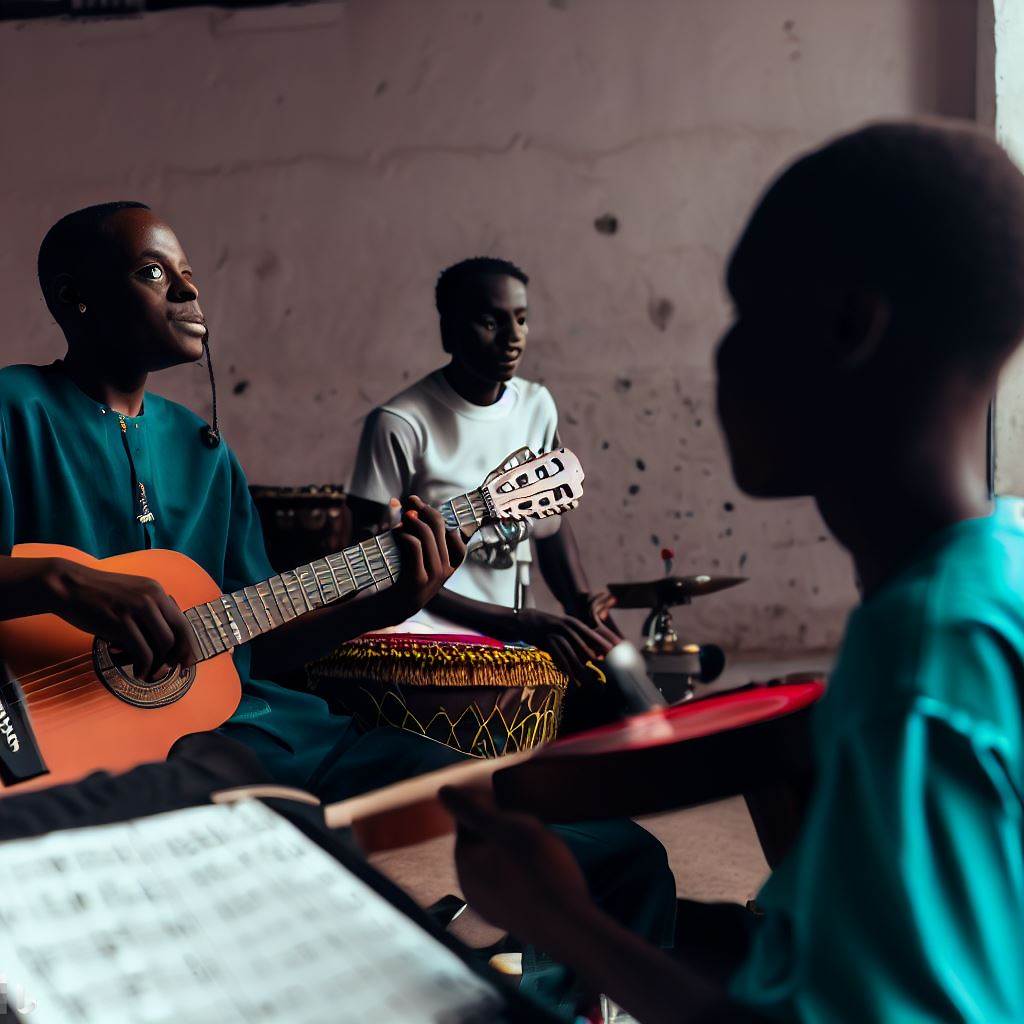Music Training and Education in Nigeria Explored
Last Updated on September 1, 2023
Introduction
Music Training and Education in Nigeria holds great importance in shaping individuals and society as a whole.
Music education plays a vital role in developing talents, cognitive skills, and cultural understanding.
It has a significant impact on personal growth, social cohesion, and economic development.
Nigeria, with its rich musical heritage, recognizes the significance of music education in cultivating artistic expression and promoting cultural identity.
Historical Overview of Music Education in Nigeria
Music education in Nigeria has a rich history that traces back to its roots and has evolved over time.
This section will delve into the origins of music education in Nigeria, highlight traditional music education practices in different regions, and discuss the influence of Western music education during colonial times.
Roots of Music Education in Nigeria
Music has always played a significant role in Nigerian culture. Traditional music education was primarily transmitted orally through songs, chants, and rhythmic patterns.
It served as a means of passing down cultural values, history, and traditions from one generation to the next.
Traditional Music Education Practices in Different Regions
Nigeria’s diverse ethnic groups each had their unique music traditions and educational practices.
In the northern regions, music education was deeply rooted in Islamic traditions, with the Quran recitation as a fundamental aspect.
In the Yoruba culture of the southwest, music education emphasized drumming, dance, and storytelling.
The Igbo people in the southeast nurtured music education through the ekwe (wooden slit drum) and other traditional instruments.
Introduction of Western Music Education during Colonial Times
The arrival of colonial powers brought about the introduction of Western music education in Nigeria.
Missionaries played a crucial role in establishing schools and churches, where they introduced hymns and Western musical instruments.
This marked the beginning of a profound influence on Nigerian music education.
Influence of Missionaries on Music Education
Missionaries established schools that incorporated Western music education, teaching European music theory, notation, and classical hymns.
They introduced instruments such as the piano, organ, violin, and brass instruments.
Western choral music became prominent, and the concept of music notation began to take root.
Emergence of Nigerian Composers and Music Educators
As Western music education flourished in Nigeria, local composers and music educators emerged.
They adapted Western music forms and techniques to Nigerian styles while incorporating traditional instruments and elements.
These pioneers became instrumental in documented Nigerian music practices and promoting music education in formal settings.
Music Education in Independent Nigeria
After gaining independence, Nigeria focused on promoting its own cultural heritage through music education.
The government recognized the importance of preserving Nigerian music traditions and integrating them into the national curriculum.
The establishment of music schools and departments in universities further solidified music education in Nigeria.
Contemporary Challenges and Developments
Despite the progress made, music education in Nigeria still faces challenges.
Limited funding, inadequate facilities, and a lack of qualified music teachers are persistent issues.
However, various organizations and initiatives are working to address these challenges.
Technology has also played a significant role, allowing for the dissemination of music education through online platforms and digital resources.
The historical overview of music education in Nigeria reveals the deep-rooted nature of music in Nigerian culture.
From traditional practices to the introduction of Western music during colonial times, music education has played a vital role in preserving cultural heritage and promoting creativity.
While facing challenges, the current landscape of music education in Nigeria continues to evolve, embracing both traditional practices and contemporary developments.
Read: The Economics of Music in Nigeria: A Deep Dive
Current State of Music Education in Nigeria
In this section, we will explore the current state of music education in Nigeria, focusing on the overview of the educational system, the inclusion of music education in the national curriculum, and the availability and accessibility of music training in schools.
A. The current educational system in Nigeria
- The Nigerian educational system consists of three levels: primary, secondary, and tertiary.
- Primary education is compulsory and lasts for six years, while secondary education lasts for six years as well.
- Tertiary education in Nigeria includes universities, polytechnics, and colleges of education.
- There is a growing emphasis on providing a well-rounded education that includes arts and culture.
- However, there are still challenges in providing quality education across all levels, including music education.
B. Inclusion of music education in the national curriculum
- Music education is included in the Nigerian national curriculum, both at the primary and secondary levels.
- At the primary level, music is taught as part of the cultural studies curriculum.
- At the secondary level, music becomes an elective subject that students can choose to study.
- The inclusion of music education in the curriculum is a positive step towards promoting a holistic education.
- However, the quality and depth of music education can vary across different schools and regions.
C. Availability and accessibility of music training in schools
- The availability and accessibility of music training in schools in Nigeria are limited.
- Only a small number of schools have dedicated music teachers or music departments.
- Most schools do not have adequate resources, such as musical instruments or training materials.
- This lack of resources hinders students’ ability to receive comprehensive music training.
- Furthermore, music training is often seen as an extracurricular activity rather than an integral part of the curriculum.
The current state of music education in Nigeria faces various challenges related to the overall quality of education, the inclusion of music in the curriculum, and the availability and accessibility of music training in schools.
While there have been efforts to incorporate music education into the national curriculum, more needs to be done to ensure that all students have equal access to quality music training.
By investing in music education and providing the necessary resources, Nigeria can foster a generation of talented musicians and contribute to the growth of its vibrant music industry.
Read: Essential Skills for Becoming a Cinematographer in Nigeria
Challenges and Issues in Music Education
Music education in Nigeria faces various challenges and issues that hinder its growth and development.
These include:
A. Lack of resources and funding for music education
- Inadequate funding and lack of resources significantly limit opportunities for quality music education.
- Low budgets allocated to music programs result in insufficient musical instruments, sheet music, and other essential resources.
- The lack of financial support makes it challenging for schools and institutions to organize music events and performances.
- Insufficient funding also affects the implementation of music curriculum and training programs.
- Without adequate resources and funding, music education struggles to reach its full potential in Nigeria.
B. Shortage of qualified music teachers
- The scarcity of qualified music teachers is a significant obstacle to the effective delivery of music education.
- Not enough music teachers with proper training and qualifications are available to meet the demand.
- Many schools and institutions struggle to recruit and retain competent music educators.
- The lack of qualified teachers limits students’ access to quality music instruction and mentorship.
- Addressing this shortage is crucial to ensure the consistent and uninterrupted growth of music education in Nigeria.
C. Lack of support and recognition for music as an academic discipline
- Music is often not given the same recognition and importance as other academic disciplines.
- There is a prevailing belief that music is merely an extracurricular activity and not a serious academic pursuit.
- This perception negatively impacts the resources, funding, and support allocated to music education.
- The absence of a strong academic focus on music limits its potential as a profession and a field of study.
- It is essential to raise awareness about the value and significance of music as an academic discipline in Nigeria.
Overcoming these challenges is crucial for the growth and development of music education in Nigeria.
Adequate funding, allocation of necessary resources, and support from educational authorities are essential for a vibrant and successful music education system.
Steps need to be taken to attract and retain qualified music teachers, ensuring students have access to quality instruction.
Recognizing music as a legitimate academic discipline will also lead to increased support and opportunities for aspiring musicians and music educators.
Read: Top Artists’ and Performers’ Managers in Nigeria Today
Success Stories and Impact of Music Education
Music education in Nigeria has been instrumental in nurturing and developing the talents of individuals who have achieved remarkable success in the field of music.
Here are some inspiring success stories and the impact of music education in Nigeria:
A. Individuals Excelling in Music Education
- Davido: Born David Adeleke, Davido is a Nigerian singer, songwriter, and record producer. He attended music school in Lagos and later studied Business Administration at Babcock University.
His music education background has played a significant role in shaping his craft and creating successful albums. - Tiwa Savage: Tiwa Savage is a Nigerian singer, songwriter, and actress. She studied music at the Berklee College of Music in Boston, Massachusetts, where she honed her skills as a vocalist and performer.
Her music education has contributed to her international success and recognition. - P-Square: P-Square is a Nigerian R&B duo comprising twin brothers Peter and Paul Okoye.
hey studied music at the University of Abuja and gained practical knowledge in composing, producing, and performing.
Their music education has been instrumental in their rise to fame and prominence in the Nigerian music industry.
B. Positive Effects of Music Education
Music education in Nigeria has had profound positive effects on personal development and career opportunities:
- Enhanced Cognitive Abilities: Music education stimulates brain development, improving memory, attention, and problem-solving skills. It enhances critical thinking and promotes creativity.
- Improved Emotional Well-being: Music education provides a platform for emotional expression and self-discovery. It helps individuals cope with stress, develop empathy, and build resilience.
- Enhanced Cultural Awareness: Music education fosters an appreciation for diverse cultures, promoting tolerance and understanding among individuals in Nigeria. It helps bridge cultural gaps and encourages a sense of unity.
C. Impact on Cultural Preservation and Promotion
Music education in Nigeria plays a crucial role in preserving and promoting the rich cultural heritage of the country:
- Preservation of Traditional Music: Music education ensures that traditional Nigerian music, including indigenous instruments, melodies, and rhythms, is passed down to the younger generations. This helps preserve Nigeria’s cultural identity.
- Integration of Cultural Elements: Music education encourages the fusion of traditional Nigerian music with contemporary styles, enabling artists to create unique sounds that showcase their cultural heritage while appealing to a global audience.
- Promotion of Nigerian Music Globally: Musicians who have received formal music education in Nigeria often embark on international tours and collaborations, exposing the world to the vibrant and diverse musical culture of Nigeria.
Music education in Nigeria has been instrumental in nurturing and developing talents, leading to remarkable success stories.
Its positive effects on personal development, career opportunities, and cultural preservation and promotion are undeniable.
Music education not only empowers individuals but also strengthens Nigeria’s position in the global music industry.
Read: Becoming an Agent: Pathways in Nigeria’s Art Scene

Efforts and Initiatives in Improving Music Education
In Nigeria, various efforts and initiatives have been undertaken to enhance music education and provide opportunities for aspiring musicians.
Government Initiatives and Policies
- The Nigerian government recognizes the importance of music education and has implemented several initiatives.
- Government policies have been put in place to ensure the inclusion of music in the curriculum of educational institutions.
- Funding has been allocated to support music programs and provide resources for music education.
- Scholarships and grants are offered to talented students pursuing music studies.
- Music competitions and festivals are organized by the government to promote musical talents.
Role of Non-Governmental Organizations and Music Institutions
- Non-governmental organizations (NGOs) play a crucial role in improving music education in Nigeria.
- NGOs collaborate with schools and communities to establish music programs and provide training for teachers.
- Music institutions, such as music schools and conservatories, offer specialized training for individuals interested in pursuing music careers.
- These institutions provide comprehensive music education, including theory, practical skills, and performance opportunities.
- They also organize workshops, masterclasses, and mentorship programs to nurture young talents.
Use of Technology to Improve Access to Music Education
- Technology has played a vital role in improving access to music education throughout Nigeria.
- Online platforms and educational websites offer music lessons, tutorials, and resources to learners of all ages.
- Virtual classrooms and video conferencing enable remote learning and connect students with music teachers.
- Mobile applications and interactive music software provide interactive exercises and facilitate self-paced learning.
- Streaming platforms and digital music libraries make a wide range of music accessible for educational purposes.
Overall, the combined efforts of the government, non-governmental organizations, and the use of technology have significantly contributed to the improvement of music education in Nigeria.
These initiatives have not only enhanced access to music education but also fostered talent development, cultural preservation, and the overall growth of the music industry in the country.
Conclusion
This blog post explored music training and education in Nigeria. It highlighted the challenges faced by musicians and students, such as the lack of funding and infrastructure.
However, it also emphasized the importance of music education in Nigeria as a means of fostering creativity, preserving cultural heritage, and developing skills in young people.
It is crucial to recognize and support the value of music training and education in Nigeria.
By investing in this sector, we can provide opportunities for aspiring musicians, cultivate a thriving music industry, and contribute to the overall development of the country.
Further support and investment in music education are needed to address the existing challenges and strengthen the music sector in Nigeria.
This can be achieved through the establishment of music schools, scholarships, and the provision of instruments and infrastructure.
Collaboration between educational institutions, government, private sector, and individuals is vital in ensuring the sustainability and growth of music education in Nigeria.
Let us come together to unlock the immense potential of music education and empower future generations of Nigerian musicians.
By doing so, we can celebrate and promote the rich musical heritage of our country while shaping a brighter future for aspiring musicians.


